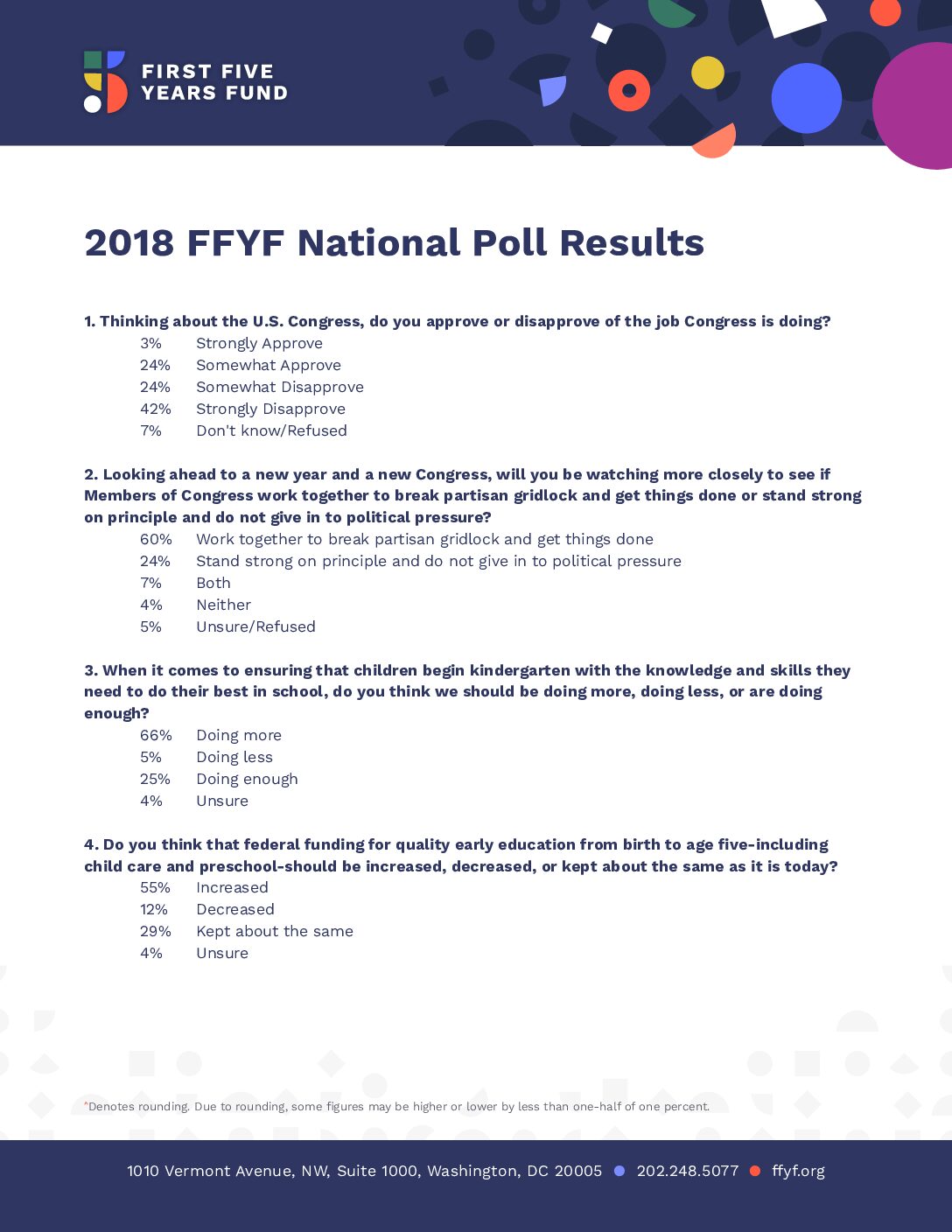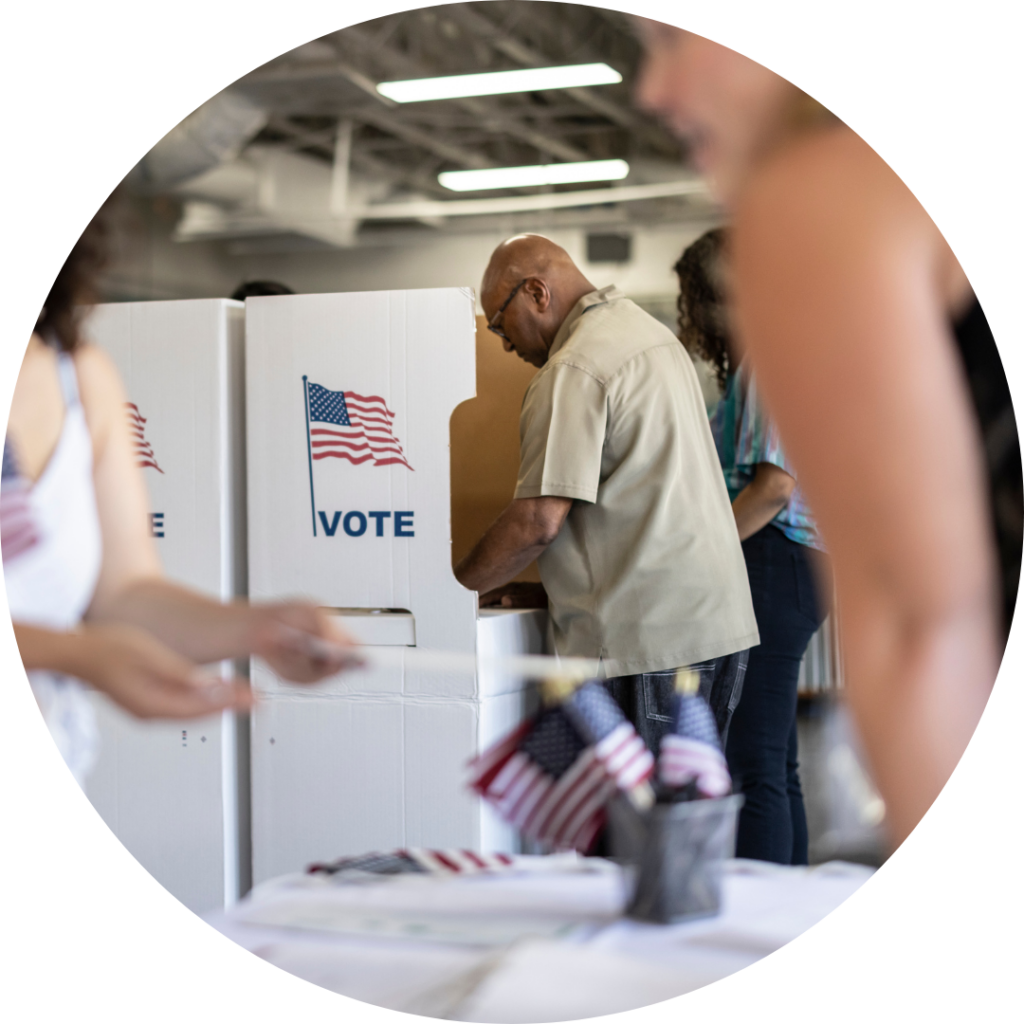2018 National Poll: Results By Question
FFYF’s sixth year of national polling, conducted in the days immediately following the 2018 Midterm Elections, shows Democratic and Republican voters alike expect members of Congress from across the aisle to work together to get things done—and investing in early childhood education opportunities remains a rare issue that has strong support across parties. In fact, voters are less interested in seeing partisans stand their ground than they are seeing them stand up for young children and their families.
The following is a breakdown of our 2018 National Poll results by question.
- Thinking about the U.S. Congress, do you approve or disapprove of the job Congress is doing?
3% Strongly Approve
24% Somewhat Approve
24% Somewhat Disapprove
42% Strongly Disapprove
7% Don’t know/Refused
- Looking ahead to a new year and a new Congress, will you be watching more closely to see if Members of Congress work together to break partisan gridlock and get things done or stand strong on principle and do not give in to political pressure?
60% Work together to break partisan gridlock and get things done
24% Stand strong on principle and do not give in to political pressure
7% Both
4% Neither
5% Unsure/Refused
- When it comes to ensuring that children begin kindergarten with the knowledge and skills they need to do their best in school, do you think we should be doing more, doing less, or are doing enough?
66% Doing more
5% Doing less
25% Doing enough
4% Unsure
- Do you think that federal funding for quality early education from birth to age five-including child care and preschool-should be increased, decreased, or kept about the same as it is today?
55% Increased
12% Decreased
29% Kept about the same
4% Unsure
Identify whether each of the following is very important, somewhat important, not that important, or not important at all.
- Making available high-quality early learning and child care programs for infants and toddlers to give them a strong start on developing school ready knowledge and social skills.
55% Very important
25% Somewhat important
11% Not that important
9% Not at all important
1% Unsure
79%^ Total important
20% Total not important
- Providing voluntary home visiting and parent education programs that help parents support their child’s early learning, health and emotional development.
43% Very important
34% Somewhat important
11% Not that important
9% Not at all important
1% Unsure
78%^ Total important
21%^ Total not important
- Helping working families afford the cost of early education and child care.
62% Very important
25% Somewhat important
6% Not that important
6% Not at all important
1% Unsure
87% Total important
12% Total not important
- Helping states and local communities build better preschool services for parents and making them more accessible to children from low- and middle-income families.
66% Very important
21% Somewhat important
6% Not that important
6% Not at all important
1% Unsure
87% Total important
12% Total not important
- About how many of the early education programs in your area would you say are high quality AND affordable for lower and middle income families?
4% All
11% Most
16% About half
19% Only some
27% Very few
23% Unsure
15% Total all/most
16% About half
45%^ Total some/few
- If your Member of Congress supported policies and funding for more families to have quality child care and preschool, would you have a more favorable impression of him or her, less favorable impression or would it not affect your opinion much one way or the other?
32% Much more favorable
26% Somewhat more favorable
34% No difference
2% Somewhat less favorable
5% Much less favorable
1% Unsure
58% Total more favorable
7% Total less favorable
- Compared to other issues like the economy or health care, how important are issues involving early childhood education for you in deciding whether to support an elected public official? Are they…
25% Very important, they are a primary factor in deciding whether to support an elected public official
44% Somewhat important; they are one of several issues you consider
19% Not too important; they are not a significant factor considered in deciding whether to support an elected public official
12% Not at all important for you in deciding whether to support an elected official
69% Total important
31% Total not important
- (ASKED ONLY OF DEMOCRATS AND INDEPENDENTS): Which one of the following statements comes closer to your point of view?
78% It is more important that funding for early childhood education be increased, even if this means the Trump Administration can take some credit for helping children and families
11% It is more important that the Trump Administration does not have a chance to take credit for helping children and families, even if this means that funding for early childhood education is not increased
1% Both equally
5% Neither
5% Unsure
Coming up, Congress may be considering a number of proposals that provide more families the opportunity for their children to attend high- quality child care and preschool. For each one please indicate whether you would support or oppose that particular change.
- Increase the child care tax credit to help parents better afford quality child care and early education programs, with low- and middle-income parents who need more help getting a larger credit.
50% Strongly support
30% Somewhat support
7% Somewhat oppose
10% Strongly oppose
2% Unsure
81%^ Total support
17% Total oppose
- Provide tax incentives to businesses which provide or help their employees afford quality early childhood education programs.
52% Strongly support
32% Somewhat support
7% Somewhat oppose
6% Strongly oppose
3% Unsure
84% Total support
13% Total oppose
- Provide greater funding to Head Start and early Head Start which provide quality early education, nutrition, and support services to children in low-income families, so more programs can serve more children and families.
58% Strongly support
22% Somewhat support
9% Somewhat oppose
9% Strongly oppose
2% Unsure
80% Total support
18% Total oppose
- Increase federal funding to states to create or build on their own programs that directly helps low-income children, so their parents have quality child care while they work or attend school.
54% Strongly support
27% Somewhat support
7% Somewhat oppose
10% Strongly oppose
1% Unsure
81% Total support
18%^ Total oppose
- Expand the federal partnership through grants and policies that enable states and communities to improve access to quality early childhood education for children from ages birth through five who are from low- and middle-income families.
49% Strongly support
32% Somewhat support
9% Somewhat oppose
9% Strongly oppose
1% Unsure
81% Total support
18% Total oppose
- I’m going to read you two statements about these proposals. Please tell me which of the following statements comes closer to your opinion, even if neither one matches your opinion exactly.
57% Supporters of this approach say that… Investing in child care and early education is investing in our future. Members of Congress from both parties need to come together and act now to help working families ensure our children get a strong start in life.
40% Opponents of this approach say that… Federal programs just create new bureaucracies and end up wasting money that would be better spent directly helping children. Besides, we need to focus on properly funding education overall, not just early education.
1% Both
1% Neither
1% Unsure
If more children are able to attend quality child care and preschool, how much would it help in each of the following areas? Does it help a lot, a fair amount, some, very little, or not at all in each of the following areas?
- Children having academic success in elementary school.
57% A lot
16% A fair amount
17% Some
5% Very little
3% Not at all
2% Unsure
73% Total a lot / fair amount
- Children having academic success in middle school and high school.
57% A lot
16% A fair amount
16% Some
5% Very little
6% Not at all
73% Total a lot / fair amount
- 2 Children will develop important social skills, such as self-confidence, self-discipline, and ability to work well with others that are necessary for success throughout life.
56% A lot
15% A fair amount
18% Some
5% Very little
6% Not at all
71% Total a lot / fair amount
- Breaking the cycle of poverty by ensuring children from low-income families experience high-quality educational opportunities that might otherwise be out of reach.
51% A lot
15% A fair amount
19% Some
8% Very little
7% Not at all
1% Unsure
65%^ Total a lot / fair amount
- Enabling more mothers to be able to start or continue their careers and provide for their families.
55% A lot
16% A fair amount
20% Some
3% Very little
5% Not at all
1% Unsure
71% Total a lot / fair amount
- Boosting our economic future in the long-term by ensuring more future workers are highly skilled.
50% A lot
16% A fair amount
18% Some
6% Very little
8% Not at all
1% Unsure
67% Total a lot / fair amount
FOR STATISTICAL PURPOSES:
- To ensure we have a representative sample of voters, please tell me in what year you were born.
24% 18-34
21% 35-44
14% 45-54
22% 55-64
18% 65+
1% Refused
- Do you have any children age 18 or under that you are responsible for raising, living in your home?
32% Total yes
65% Total no
10% Yes; not yet in kindergarten
18% Yes; kindergarten and elementary school
20% Yes; middle or high school
5% Yes; graduated
43% No; no children
20% No children at home
- IF ANSWER TO QUESTION 2 INDICATED PRESENCE OF YOUNG CHILDREN: Are any of your children in child care or an early education setting where they are cared for by someone other than a parent on a regular basis?
57% Yes
42% No
1% Refused
- IF ANSWER TO QUESTION 2 INDICATED 2-4 CHILDREN: Before they began kindergarten or elementary school, were any of your children in child care or an early education setting where they were cared for by someone other than a parent on a regular basis?
70% Yes
30% No
- And in politics today, do you consider yourself…
25% Strong Republican
6% Not so strong Republican
6% Lean to Republicans
6% Lean to Democrats
9% Not so strong Democrat
28% Strong Democrat
1% Refused
37% Total Republican
43% Total Democrat
19% Something else / Independent
- Generally speaking, do you consider yourself to be conservative, moderate, or liberal on most issues?
20% Very conservative
20% Somewhat conservative
30% Moderate
28% Liberal
2% Don’t know
1% Refused
- Finally, regardless of how you may feel today, for which of the following candidates did you vote for President?
40% Donald Trump
43% Hillary Clinton
3% Gary Johnson
2% Jill Stein
4% Someone else
3% Did not vote
1% Don’t know / don’t recall
4% Refused
- What was the last level of education you completed?
26% Graduated high school or less
3% Technical or vocational school
25% Some college
29% Graduated college
16% Graduate/professional school
1% Refused
26% High school or less
28% Some college / technical / vocational
45% College or higher
- If you added together the yearly income of all the members of your family who were living at home last year, would the total be less than $10,000, between $10,000 and $20,000, between $20,000 and $30,000, between $30,000 and $40,000, between $40,000 and $50,000, between $50,000 and $75,000, between $75,000 and $100,000, between $100,000 and $200,000 or would the total be more than that?
5% Less than $10,000
6% $10,000 – $20,000
7% $20,000 – $30,000
8% $30,000 – $40,000
8% $40,000 – $50,000
17% $50,000 – $75,000
14% $75,000 – $100,000
18% $100,000 – $200,000
7% More than $200,000
10% Refused
26% Less than $40k
25% $40k – $75k
14% $75k – $100k
25% $100k or more
- Other than being an American, what is your main ethnic or racial heritage?
12% African American or Black
74% White
10% Hispanic American or Latino
1% Asian American
1% Other
2% Refused
- How would you describe the area where you currently live?
28% A city
29% A suburban area
23% A small town
18% A rural area
1% Don’t know / not sure
1% Refused
- What is your gender? Are you currently employed, a student, a stay-at-home (mom/dad), retired, or unemployed and looking for work?
30% Male / employed
2% Male / student
1% Male / stay-at-home
10% Male / retired
3% Male / unemployed and looking
1% Male / refused
29% Female / employed
2% Female / student
6% Female / stay-at-home
13% Female / retired
2% Female / unemployed and looking
1% Female / refused
47% Total male
53% Total female
Subscribe to FFYF First Look
Every morning, FFYF reports on the latest child care & early learning news from across the country. Subscribe and take 5 minutes to know what's happening in early childhood education.




